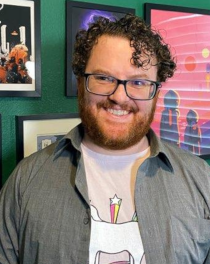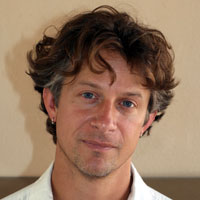Jeremy Antley
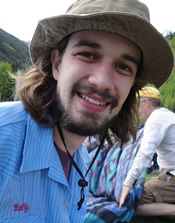
Jeremy Antley holds a PhD in Russian History from the University of Kansas and currently resides in Portland, Oregon. His most recent work on games and culture can be found at Real Life and First Person Scholar.
Kevin Ballestrini
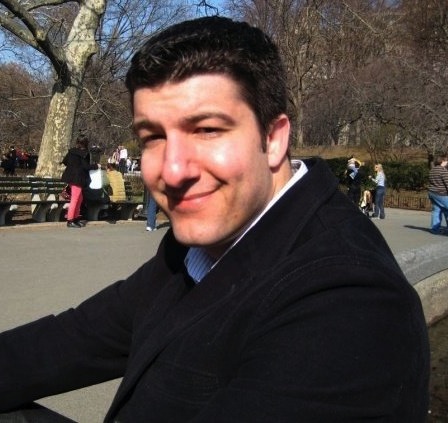
Kevin Ballestrini teaches Latin and Mythology at the Norwich Free Academy in Connecticut. He has received an M.A. and B.A. in Classics from the University of Colorado and University of Connecticut respectively. In addition to experience teaching in a traditional classroom setting, Kevin is deploying the first fully practomimetic introductory language course at the high school level this year in a section of Latin I. He hopes that the experience will enhance student engagement and connection to life and culture in ancient Rome. As an avid technology enthusiast, he maintains his blog, Techna Virumque Cano (http://kevinbal.blogspot.com) where he discusses the intersection of technology and his teaching. Kevin is also the leader of a Lord of the Rings Online kinship and has a great interest in exploring how games contribute to the development of (online) communities just as the bardic tradition contributed to the development of ancient communities. You can also find Kevin on Twitter at http://www.twitter.com/kballestrini.
Emily Joy Bembeneck

Emily Bembeneck is a Ph.D. candidate at the University of Michigan in the Department of Classical Studies. She primarily works on narrative and character development in ancient epic and modern video games, both graphical and text-based. Other interests of hers include the image of the hero, Greek tragedy and social catharsis, cultural and individual identity through play, immersion, and game design, She teaches classes in Latin, Greek and Roman history, ancient war and entertainment, among other things related to the Classical world She is an active contributor at http://www.greywardens.com where she writes on the narrative structure of Bioware’s Dragon Age RPG franchise. Her current projects include working on images of Rome in ancient and modern culture, developing a Flash-based application that combines components of social play with narrative creation, and designing a Dragon Age module that explores Euripides’ Medea through post-primary narrative. When not being all academic and studious, she is likely either playing an elf in some virtual world or spending time with her two young sons. Find her online at Ada Play and on Twitter at http://www.twitter.com/adarel.
Peter Christiansen
Peter Christiansen is a writer and game developer with a background in science communication. He holds a PhD in Communication from the University of Utah, where he taught courses in videogame studies and new media. Among other things, his research focuses on videogame rhetoric, science and technology studies, independent game development, and videogame modding. He has been making games professionally in one way or another since 2005 and is currently the head game developer for the ASPIRE project, the outreach program for the Utah High Energy Astrophysics Institute, where he creates games to teach kids about physics. In addition, he has worked on various independent projects, including a number of entries in local and global game jams. He plays a lot of Civilization and Minecraft, as well as a wide variety of boardgames. He is currently co-editor of Play the Past, along with Gilles Roy. Peter maintains a blog at www.peterchristiansen.org and is on twitter at @theturnipmaster.
Angela R. Cox

Angela R. Cox is an Assistant Teaching Professor at Ball State University, where she teaches first year composition courses. She completed her Ph.D. in Rhetoric and Composition at the University of Arkansas in 2016. Her research has focused on genre, writing studies, fantasy popular media, and textual analysis of video games. In game studies, she specializes in 20th century PC games. Angela can also be found on Twitter: @KQscholar.
Andrew D. Devenney

Andrew D. Devenney is a trained historian currently serving as the Associate Director of the Center for Learning through Games and Simulations (CLGS) at Central Michigan University in Mount Pleasant, Michigan. A life-long and avid gamer of both video and tabletop role-playing games, Andrew has found elements of game-based learning, new media, and the digital humanities unconsciously seeping into both his scholarly work and his classrooms over the last decade, and now he spends much of his time teaching other faculty how to use these methods in their classrooms. Because he doesn’t have enough to do, Andrew also co-writes and co-produces historical documentary films through his company, Stratigraphic Productions, and publishes tabletop role-playing games and supplements through his *other* company, Superhero Necromancer Press. He wears many hats. What’s one more? Andrew can also be found online on Twitter as @adevenney.
Shawn Graham

Shawn Graham is Assistant Professor of Digital Humanities in the Department of History at Carleton University in Ottawa, Canada. He’s been blogging as ‘The Electric Archaeologist‘ since 2007, documenting his interest & experiments in game-based learning, agent based modeling, and other aspects of digital media for archaeological teaching and research. On Twitter, he’s at http://www.twitter.com/electricarchaeo. He’s published amongst other things a number of agent-based simulations on aspects of the Roman world, and has explored using Civilization mods in his distance-education classrooms. He received his PhD in Archaeology from the University of Reading in 2002, where he was interested in complexity & evolving networks in antiquity (especially in Rome). When he’s not geeking out over the latest tech toys or things archaeological, he is chief cider maker at Coronation Hall Cider Mills and playing Wii games with his family. If only there was wiiCivilization…
David R. Hussey

David R. Hussey is the Owner and Founder of SolveCOO Inc., an Internal Operations and Project Management consultancy business and a proud member of the Kitchener-Waterloo Tech community. He studied History at the University of Waterloo where he received his BA and MA and completed his Thesis A Nation of Gamers: The History of Video Games in Canada. During his studies, he examined the vast intersections of History and Video Games focusing on the themes of understanding the past through history games, portrayals of the past in games, and the video game community as their own historian. He enjoys the Legend of Zelda, Assassin’s Creed, and Uncharted as well as many, many other games. David can be found on Twitter @Dave_Hussey.
Matthew Kirschenbaum

Matthew Kirschenbaum is Associate Professor in the Department of English at the University of Maryland, Associate Director of the Maryland Institute for Technology in the Humanities (MITH, an applied thinktank for the digital humanities), and Director of Digital Cultures and Creativity, a new “living/learning” program in the Honors College. Kirschenbaum speaks and writes often on topics in the digital humanities and new media; his work has received coverage in the Atlantic, New York Times, National Public Radio, Wired, Boing Boing, Slashdot, and the Chronicle of Higher Education. He has been pushing cardboard counters around on hexagonal grids since his early teens. See http://www.mkirschenbaum.net for more.
Alvina Lai
Alvina Lai (they/them) is a Librarian. Their interests include DEI in LIS and LIS representation in pop culture. Alvina’s writing is on Play the Past, Brooklyn Botanic Garden’s “Plants & Gardens Blog,” and New York Times’ “Metropolitan Diary.” They authored the chapter “Reflections of a Non-Binary Asian American in LIS” in Trans and Gender Diverse Voices in LIS (2022). They participated in the panels “NYCC@NYPL: #OwnVoices Why Diversity Matters” (2019) and “NYCC: The Future Is Mobile: Leveraging Digital Media for Libraries & Classrooms” (2021).
Alvina served in Asian Pacific American Librarians Association (APALA 2019-22 Mentoring Committee), Chinese American Librarians Association (CALA 2020-22 Northeast Chapter Officer), and Visual Resources Association (VRA 2021-22 Equitable Action Committee). In 2021, they received the SLA-NY Rising Star Award and VRA New Horizons Award. Alvina holds a MS in Library and Information Science from Pratt Institute, a BA in Creative Writing from The New School, and a BFA in Photography from Parsons New School of Design. Alvina can be found on LinkedIn.
Rob MacDougall

Rob MacDougall is an associate professor at the University of Western Ontario where he teaches United States history and the histories of science and technology. He is the author of The People’s Network: The Political Economy of the Telephone in the Gilded Age, and is writing a book about perpetual motion machines and the cultural history of thermodynamics. He still blogs very sporadically at robmacdougall.org and is on twitter as robotnik. A life-long gamer, Rob remains interested in both the history of gaming and using games and play to encourage playful historical thinking. In his Play the Past bio ten years ago, Rob said, “he looks forward to seeing how good computer games will have gotten by the time he gets tenure.” The answer: pretty good! Most of Rob’s play these days is non-digital: especially tabletop RPGs and story games, but he still loves a good 2D platformer. Left, right, jump–what else do you need?
Jeremiah McCall

Jeremiah McCall, PhD. (@gamingthepast) has taught high school history 20 years, mostly at Cincinnati Country Day School. His first professional love is high school teaching, especially designing instructional strategies that will engage and challenge his students to learn and grow. In addition to more conventional courses, Jeremiah also teaches senior electives on interactive history and (tabletop) historical simulation design. Jeremiah’s primary training is in ancient history; he authored a book on the cavalry of the Roman Republic, and three subsequent books on Roman history topics for Pen&Sword Press. In 2011 Jeremiah published Gaming the Past: Using Video Games to Teach Secondary History with Routledge. As an extension of his teaching philosophy — that history is primarily the study and evaluation of competing interpretations of the past — Jeremiah has conducted numerous classroom implementations of historical games as historical interpretations. He maintains the website gamingthepast.net, one of the primary sites devoted to the use of historical games as history in classroom teaching and beyond. When first asked to craft a Play the Past byline in 2010, Jeremiah wrote, “he also plays far more video games — particularly RPGs and strategy — than you’d think he could find time for.” Now he dreams of the days when he used to have that much time to play.
Katy Meyers

Kate Meyers Emery is the manager of digital engagement at the George Eastman Museum, using her digital skills to educate and engage both online and in person through social media, interactives, and games. As a graduate student at Michigan State University, she was active in digital humanities and was the lead designer on an Ancient Egypt based educational mod of Civilization V. In her free time she loves playing first person shooter and adventure video games, and a fan of Milton-Bradley board game classics. She’s interested in the role of games for outreach and education in cultural heritage. Kate can be found online at meyersemery.com and on Twitter at @kmeyersemery.
Rebecca Mir

Rebecca is an advocate for inclusive, accessible, and body-conscious design and is often inspired by the educative potential of games and meaningful play. Rebecca earned her M.A. in Decorative Arts, Design History, and Material Culture at the Bard Graduate Center in 2012 and her B.A. in Art History from Indiana University of Pennsylvania in 2010. She can be found on Twitter @mirseum.
Jeff Mummert

Jeff Mummert is the Social Studies Department Chair at Hershey High School in Hershey, PA and teaches history at York College of Pennsylvania. Jeff designs and teaches online classes for K12 educators for Eduspire through Wilson College including Game-Based Pedagogy and Gamification in Education. You can find him on twitter @jsmummert
Trevor Owens
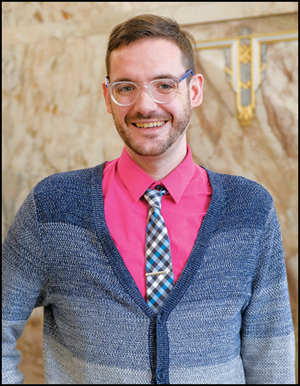
Trevor Owens is a librarian, researcher, policy maker, and educator advancing digital infrastructure and programs for libraries and archives. Owens serves as the first Head of Digital Content Management at the Library of Congress. He is also a Public Historian in Residence at American University, and a lecturer for the University of Maryland’s College of Information, where he is also a Research Affiliate with the Digital Curation Innovation Center. In 2005 and 2006 he helped organize the first two meetings of the Games, Learning, and Society Conference. He received a bachelors degree in the history of science form the University of Wisconsin, and a masters degree in American History with and emphasis on digital history and a Ph.D in educational research from George Mason University. Trevor has spent considerable amounts of time playing all iterations of Civilization, but is also a big fan of role playing games (everything from Earthbound to Fallout). Trevor is the author of three books, the most recent of which, The Theory and Craft of Digital Preservation, was published by Johns Hopkins University Press in 2018 and has won outstanding publication awards from both the American Library Association and the Society of American Archivists. His research and writing has been featured in: Curator: The Museum Journal, Digital Humanities Quarterly, The Journal of Digital Humanities, D-Lib, Simulation & Gaming, Science Communication, New Directions in Folklore, and American Libraries. When not researching, writing, or gaming, he also enjoys playing the violin. Trevor can be found online at http://www.trevorowens.org and on Twitter at http://www.twitter.com/tjowens
Gilles Roy

Gilles is a graduate of the Game Design program at L’Institut National de l’Image et du Son (L’INIS) in Montreal, Quebec, and worked for over 10 years as an educational workshop designer at the National Film Board of Canada. As a game critic, Gilles’ main areas of investigation are the politics of simulation, narrative design, self-reflexive play and game-based learning. Born in the Canadian prairies, Gilles moved to Montreal, Québec in 1999 to pursue studies in Greek philology at Concordia University, eventually earning a M.A in History at the Université de Montréal. Currently a language teacher in rural Québec, Gilles is also an avid reader of all things philosophical and historical, and keeps an active music career on the side. You can find him on the twittosphere @gillesroy.
Mark Sample
Mark Sample is an Assistant Professor of contemporary literature and new media studies in the Department of English at George Mason University. In addition to his work on electronic literature, videogames, and code studies, Mark is an outspoken advocate of open source pedagogy and open source research. In recognition of his commitment to innovation in teaching, Mark was the recipient of George Mason’s 2010 Teaching Excellence Award. Mark is a regular contributor to ProfHacker, and can also be found online at samplereality.com or on Twitter as @samplereality.
Christopher Sawula

Christopher Sawula is the Visual Resources and Spatial Art History Librarian in the Art History Department at Emory University. He received a bachelors degree in History from Boston College and a PhD in American History from Emory University. His research focuses on the development of working class identity and culture in early New England. In his current position, he manages a variety of digital art history projects and explores how digital environments enable new approaches to narrative and argument. Christopher can be found online at christophersawula.com and on Twitter as @csawula
Roger Travis

Roger Travis is an Associate Professor of Classics in the Department of Literatures, Cultures & Languages of the University of Connecticut. He received his Bachelor’s degree in classics from Harvard College, and his Ph.D. in comparative literature from the University of California, Berkeley before arriving at UConn in 1997. He has published on Homeric epic, Greek tragedy, Greek historiography, the 19th C. British novel, HALO, and the massively-multiplayer online role-playing game He has been President of the Classical Association of New England and of the Classical Association of Connecticut. He is a founder and contributor of the collaborative blog Play the Past. Roger also works on developing and studying a form of game-based learning, practomimetic learning, in which learners play the curriculum as an RPG wrapped in an ARG.
Ethan Watrall
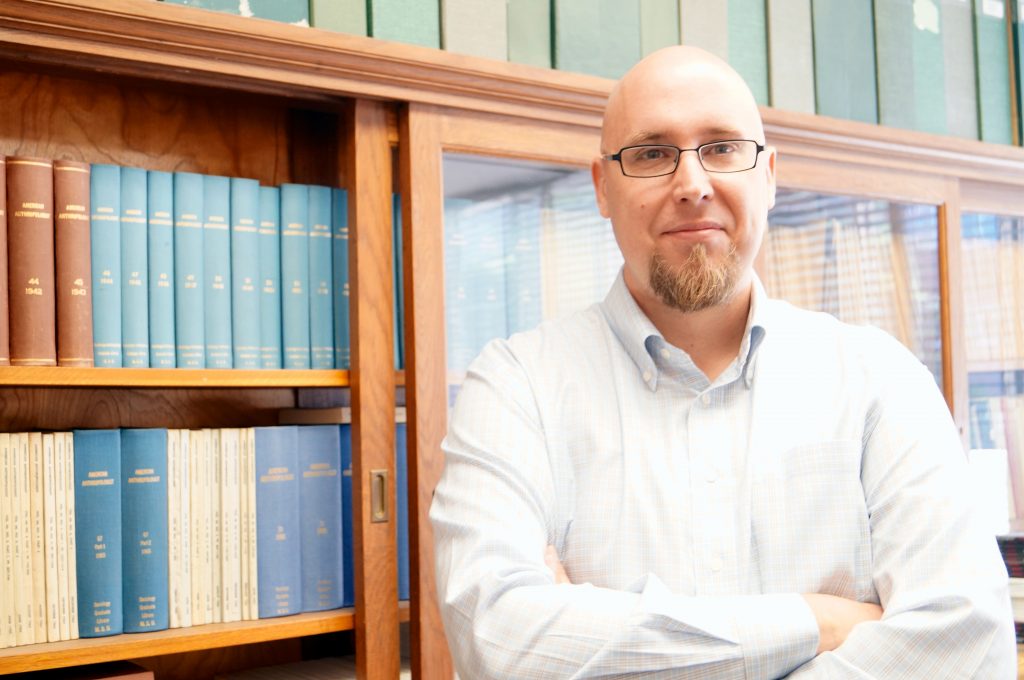
An anthropological archaeologist who has worked in Canada, the United States, Egypt, and the Sudan, Ethan Watrall is Associate Professor in the Department of Anthropology and Associate Director of MATRIX: The Center for Digital Humanities & Social Sciences at Michigan State University. Ethan also serves as an Adjunct Curator of Archaeology at the Michigan State University Museum. In addition, Ethan is Director of the Cultural Heritage Informatics Initiative and the Digital Heritage Fieldschool in the Department of Anthropology at Michigan State University. He also manages the Department of Anthropology’s Digital Heritage Imaging & Innovation Lab (which is a partnership between the Department of Anthropology and The Lab for the Education and Advancement in Digital Research)
Ethan’s scholarship focuses on the application of digital methods and computational approaches within archaeology and heritage. This focus expresses itself in three domains: (1) publicly engaged digital heritage and archaeology; (2) digital documentation and preservation of tangible heritage and archaeological materials; and (3) building capacity and communities of practice in digital heritage and archaeology. The thematic thread that binds these domains together is one of preservation and access – leveraging digital methods and computational approaches to preserve and provide access to archaeological and heritage materials, collections, knowledge, and data in order to facilitate research, advance knowledge, fuel interpretation, and democratize understanding and appreciation of the past.

